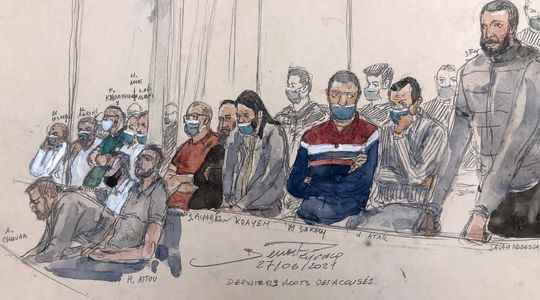It is a historic decision, for a trial that is no less so. After ten months of hearing and nearly 400 survivors or relatives at the bar, the special assize court of Paris ruled this Wednesday, June 29 on the fate of Salah Abdeslam, the only member still alive of the commandos who made 130 dead in Paris and Saint-Denis on November 13, 2015, and 19 other accused. Salah Abdeslam was sentenced to incompressible life imprisonment, believing that this “key player” had “remained faithful to his ideology to the end” and had never expressed “the slightest remorse”.
Entirely filmed, as was that of Klaus Barbie or Maurice Papon in their time, this trial then constitutes material for history, the images of which will not be accessible for 50 years. For the sociologist and specialist in terrorism Michel Wieviorka, this process will make it possible to analyze the event coldly, without stopping at the subjective dimension of the victims. President of the scientific council of the future “Museum-Memorial of Terrorism”, Michel Wieviorka believes that memory is inseparable from the history that is being played out.
L’Express: What inspired you with the trial of the attacks of November 13, 2015, which ended on Wednesday June 29?
Michael Wieviorka : Overall, I think this trial has been extremely useful, because it is when things are happening in court, when the facts are established with as much precision as possible, that victims can make known their point of view and that the truth can emerge. The trial is the moment when the traumatic event is dealt with on the merits by society, and this in a democratic way. Two remarks, however, darken the picture somewhat. On the one hand, this trial is unfortunately not “total”, in the sense that all the organizers and members of the commando who caused 130 deaths in Paris and Saint-Denis could not be judged. Then, I won’t hide from you that I found it a bit long, although the duration is surely necessary from a legal point of view. If the lawsuit had been picked up, I think it would have had more weight in the opinion.
Did this attack receive specific treatment from the courts?
It must be recognized that this attack is the one that marked France the most. If we had to make an analogy in terms of intensity, I would say that it is comparable to September 11, 2001 for the United States. This is not only due to the number of victims, but also to all the people around – families, friends, neighbors – who were involved and traumatized. With this attack, then the assassination of Samuel Paty five years later, we better understand the evolution of certain debates which agitate society today. There is in particular a “republicanist stiffening”, with this idea that society is in danger and threatened from within by Islamism. We feel that it is not only the nation that has been affected, but also the ability to “live together”.
Consequently, all the legal, media and logistical measures deployed seem to me to be in line with this event, which was a huge shock for all French people. Behind it is also the image of the rule of law that is at stake, and the demonstration of the fact that it is capable of resisting barbarism.
How to maintain the memory of such events?
I think we shouldn’t dissociate history from memory. When there is an event of such importance, which is part of both internal processes in French society – immigration, the question of religion or the suburbs – and global – the situation in the Middle Orient -, memory must nourish history, and not free itself from it. For this reason, the fact of constituting archives, in particular by filming the trial, is fundamental, because it will make it possible to analyze the case coldly, without stopping at the subjective dimension which obviously inhabits each victim.
Regarding the strict question of memory, I think that we must first hear the victims, their relatives, but also the people who may have indirectly suffered from the attack, including the Muslims of France. There are associations that have been set up to support the victims, but it will also be necessary, when they can, to bring their memory to life, by explaining to the younger generations what they have experienced. This could take place during commemoration days, which are also important for solidifying a nation, and in schools, to keep alive the memory of what has unfortunately become an episode in the history of France.
What is the objective of the future “Museum-Memorial of Terrorism”?
The project for this establishment, which will be located at Mont Valérien, has come a long way, and should emerge in the coming years. The “museum” side will include objects relating to the attacks, such as the weapons used by the terrorists or objects belonging to victims. There will also be documents, archives, which will retrace the history or the judicial treatment of the attacks.
With the governing bodies, it was decided to start the story of this terrorism after the Algerian war, and to focus on the events that directly or indirectly affected France and the French, even if they were dead. in an attack abroad. The establishment will also be a place of research, which will welcome researchers and students working on these questions. Finally, as the second part of its name suggests, it will allow people to come and meditate, and to remember in a suitable place the traumas they or their loved ones may have suffered.
